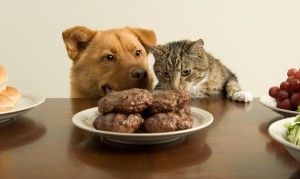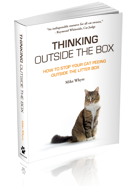 I found this article extremely beneficial in showing me which foods to avoid feeding my cat. I fall into the typical trap of giving my kitties food from the table. I think, aww… my kitty will love what I’m having for dinner and I automatically give her food from my plate. I hadn’t considered that the ingredients in my food could be something that my cats should be avoiding altogether. This is a great comprehensive list of foods that we should not be feeding our beloved pets.
I found this article extremely beneficial in showing me which foods to avoid feeding my cat. I fall into the typical trap of giving my kitties food from the table. I think, aww… my kitty will love what I’m having for dinner and I automatically give her food from my plate. I hadn’t considered that the ingredients in my food could be something that my cats should be avoiding altogether. This is a great comprehensive list of foods that we should not be feeding our beloved pets.
Foods to Avoid Giving Your Pet!
by Isaac MaCalisterYour cat is an important part of your family, so it’s definitely natural to include him in family festivities and celebrations. As in any get-together, food and drink are the center of attention and the focal points, but try to avoid indulging your cat in table foods. It may seem harmless to share food with your cat, but many common foods can be dangerous for your cat.
Fatty foods:
Rich or fatty foods can cause digestive stress for your cat. For example, turkey, ham or other meats rich in fat will result in diarrhea. Large amounts of fat digested may lead to a life-threatening inflammatory disease called feline pancreatitis. The calling signs of pancreatitis can include vomiting, abdominal pain, diarrhea and a loss of appetite. If you must feed your feline meats, satiate his hunger by giving him turkey-flavored cat food.
Bones:
Any bones from meat, fish and poultry can be a potential danger to your kitty and should be avoided at all costs. If your cat decides to pull a bone from your waste basket, or from the table or counter his digestive tract could be severely damaged. A bone can cause laceration or obstruction within your kitty’s digestive system.
Onion and garlic:
You may also be tempted to give your kitten baby food. This may contain onion powder, which is highly toxic for your cat. Any type of onion or garlic, raw, cooked or in powder form can damage your kitten’s red blood cells and cause life-threatening anemia. Another hiding spot for onion and garlic can be stews, soups and sauces.
Undercooked meat:
In rare cases, raw or undercooked meat may contain bacteria like Salmonella or E. coli, which can cause vomiting, diarrhea and loss of appetite. Also, keep your cat away from moldy or spoiled foods, which can contain toxins, that cause tremors, shaking, seizures, diarrhea and vomiting.
Some nuts:
Most nuts, including macadamia nuts contain an unknown toxin, which can affect your cat’s digestive and nervous systems. Nuts have also been known to cause muscular weakness and tremors in dogs as well. Many researchers believe that macadamia nuts can have the same effect on your cat.
Chocolate, raisins and grapes:
Unlike dogs, most cats are not drawn to sweets. Even so, take note: a chocolate snack can cause increased heart rate, tremors and hyperactivity in your cat. The severity of the reaction depends on the type of chocolate and how much is eaten. Dark baking chocolate will cause a more severe reaction than milk chocolate. Also, raisins and grapes have been proven to induce kidney failure in dogs. There have been reports of similar effects on cats, so it is wise to avoid letting your cat ingest these fruits.
Cow’s milk:
We all picture pouring our beloved kitten a fresh, cold saucer of milk. Unlikely as it may seem, milk is a no-no for your cat. Shortly after they’re weaned, kittens lose the ability to digest milk. More than a few of licks could translate into a very messy episode of diarrhea. If your kitten has a taste for milk, specially formulated lactose-free milk products are available for cats which should satisfy his craving.
The most important thing you can do for your cat is to ensure that he receives the nutrition and care that he needs. If you remember the things to avoid giving your cat, as well the things he needs to thrive, your cat will have a long, happy and healthy life as member of your family.
Check out Hartz for more helpful articles and information and tons of pet products for all kinds of animals.
Article Source: EzineArticles.com
The last portion of this article is certainly a lesson that I learned the hard way. My beautiful tuxedo cat, named Liberty was my first kitty and I loved to spoil him by giving him a bowl of warm milk every evening. To my dismay, I noticed he was having constant diarrhea and I couldn’t figure out what was causing the problem. I did a little research into the issue and found that you should never give a cat cow’s milk as their bodies can’t seem to digest it properly and they should only be given specially formulated milk made for cats.

Please contribute to this article discussion and post a comment below...
Powered by Facebook Comments